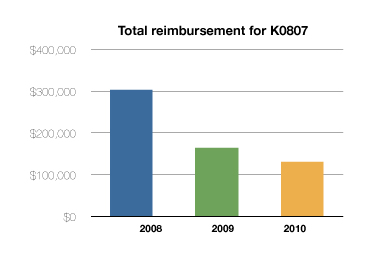Scoot over Medicare Manufacturers report uptick in sales for retail market

By Liz Beaulieu, Editor
Updated Fri November 2, 2012

YARMOUTH, Maine - Have scooters seen the same drop in utilization as power wheelchairs? It depends on the scooter.
Manufacturers say that sales are down for scooters for the Medicare market, like K0807, but they're up for scooters for the retail market.
“We've seen an increase in scooters, but only for the retail market,” said Edith Sosa, national sales coordinator for Fort Meyers, Fla.-based IMC Heartway. “I would say it's a significant increase—a lot more than we did last year.”
Total Medicare reimbursement for K0807 has plunged from $305,037 in 2008 to $165,805 in 2009 to $132,478 in 2010, according to data obtained by HME News through a Freedom of Information Act request (FOIA).
IMC Heartway has even decided that all of its new scooters, from here on out, will be geared toward the retail market, Sosa says.
An old foe
Scooters for the Medicare market have been affected by many of the same changes to reimbursement and policy that have troubled power wheelchairs, including reduced reimbursement, and a more difficult documentation and approval process, manufacturers say.
“The reimbursement isn't particularly attractive,” said Steve Neese, president of power mobility for Drive Medical. “Then you have Medicare down-coding scooters, saying 'You don't need to go 20 miles in a scooter. You're just supposed to be using it in the house. We're not paying for you to be able to use it outside.'”
Drive Medical's scooter business is up “fairly significantly,” with the majority of the increases in the retail market, Neese says.
A new friend
For scooters, the transition from the Medicare market to the retail market has been a relatively smooth one for a number of reasons, manufacturers say. First, there's the allure of not having to deal with Medicare, a factor that's becoming the mother of all motivators.
“Our resellers are telling us, because of Medicare issues with collections, it's harder to make money now, and they're more dependent on cash than anything else,” said Jean Wu, sales and marketing director for Rancho Cucamonga, Calif.-based Freerider Corp., maker of Luggie scooters.
Second, unlike some home medical equipment for the retail market, scooters are big-ticket items that can fetch hundreds, if not thousands, of dollars, manufacturers say.
A word of caution
Hoveround doesn't have a “big foot in the cash side,” of the scooter business, preferring to leave that to online retailers. What's more, the manufacturer/provider believes, in many instances, that scooters aren't the best choice for people who need help with their mobility.
“Scooters aren't that maneuverable,” he said. “A lot of ADLs are done at a table. With a scooter, you have to roll up and swivel sideways to sit at a table. The scooter platform is four or five inches above the ground, so your feet are always dangling. You can't be comfortable.”
Comments